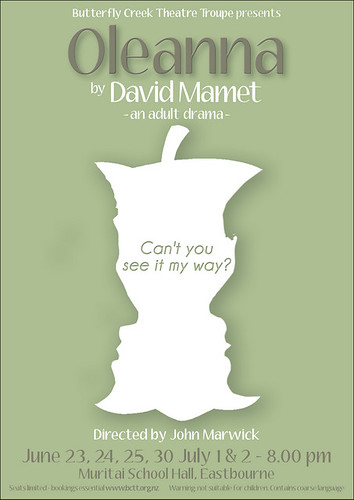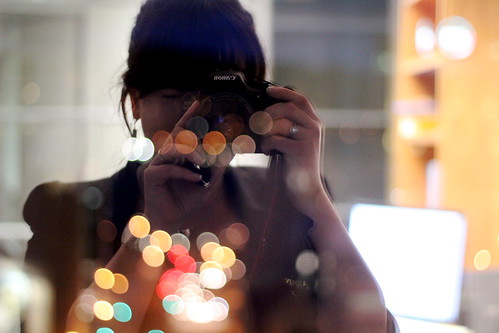
CoStar was at the show last night. It was ... a relief. And weird. He brings a whole different energy to the role than the lovely Director. He's much more pompous - despite the lack of a British accent. Hilarious.
In the mean time? we have been reviewed. Twice. One with the CoStar and one without. Incidentally, each one has mentioned the Alasdair Thompson debacle. It's an odd coincidence that Alasdair digs himself into this damn hole in the same week that we open a play about feminism, political correctness, and devastating misunderstandings.
Excerpts.
1. Maggie Rainey-Smith
David Mamet’s play is not so funny, more compelling, and thought-provoking. The acting is outstanding and all the more impressive because one of the actors, Damian Reid, was stranded in Melbourne due to the ash-cloud from the Chilean volcano, and John Marwick, Director of the play, stepped in and read the lines (to perfection) of the Professor. The student, Carol, is mesmerizingly played by Sarah-Rose Burke who has to develop the character of Carol over eighty minutes in a stunning yet subtly splendid performance. It is the first time I have seen the play and cannot compare this production with any other, but it was brilliantly rendered so that your sympathies are constantly moving (well mine, anyway) from one character to another. The wardrobe too, played a fascinating role in the development of the character of Carol, the student, who starts the play as a confused almost hapless student in her ankle-length little black socks and slipper-style shoes, and in the next act she is wearing fabulously hot shiny red shoes and the final act wearing lace-up boots, in the powerful position of being able to threaten the Professor’s tenure, and finally, much worse, for both of them.
Oh, the ending is superb, and having looked up the play, I see that the ending is often changed sometimes, depending on the Director...
“The danger with the play is that it can easily seem a partial, loaded, one-sided attack on the student and on female solidarity in general .But Pinter’s production scrupulously avoids that trap by giving equal weight to both sides of the argument.”
And so too, does John Marwick’s production.
2. Tanya Piejus
Mamet’s controversial script is based on the real-life case in the US of Anita Hill who alleged her supervisor Clarence Thomas had made provocative and harassing sexual statements while she was a student.
It can be read in two ways: as a teacher who misuses his power and seriously damages a vulnerable student, or as extreme political correctness that ruins the life of someone who only had good intentions. By the end of this production, audience opinion was divided between the two with one commenting that it was a parallel statement of both.
This is testament to director John Marwick’s skill in delivering a startling two-hander to a modern audience. Mamet wrote the play in the early 1990s and Marwick has avoided the easy option of making it a period piece, instead blurring the lines even more between who is right and who is wrong.
Two-handers are a challenge for any actor and this one is particularly so with its staccato, cut-off dialogue and unrelenting theme. Both Damian Reid as university professor John and Sarah-Rose Burke as his deceptively naïve student Carol carry their roles with assurance and skill, steadily weaving two solidly opposed characters who draw the audience’s sympathies back and forth between them.
Reid imbues John with an insufferable academic pomposity that is nevertheless well-meaning. His systematic ruin at the hands of Carol is painful to watch, but you can’t help feeling by the end of the piece that he should have known better.
Burke’s Carol is on the one hand vulnerable and helpless, and on the other sly and domineering. Her deft portrayal raises as many questions as it answers, as she twists and manipulates John’s intentions to her own agenda and that of the sinister ‘group’ she claims to represent.
The actors work on an intimate 60-seat traverse stage tucked away behind the blacks at Butterfly Creek’s usual performance venue, Muritai School Hall. It’s a brave and wise choice of staging, bringing the audience uncomfortably close to the one-room setting where all the action takes place. In fact, the final violent act of the play was so close to the front row that it freaked out the audience member closest to it.

No comments:
Post a Comment